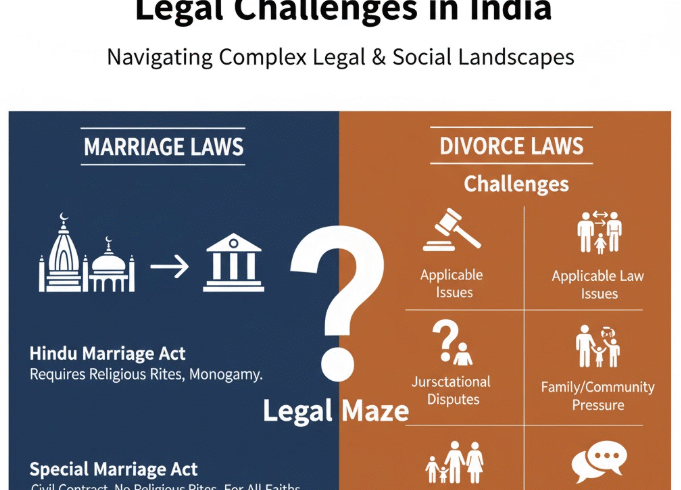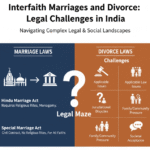Fast-Track Divorces in India: Myth or Reality?
When a marriage fails, the emotional distress is painful enough. The last thing anyone needs is to spend years in court, emptying their bank accounts and their minds. There is where the concept of a “fast-track divorce” takes on meaning. But is it real, or is it the sort of hope that lawyers peddle to unhappy couples?
In India, divorce is widely associated with a long and painful journey through the courts. Movies and TV shows depict couples fighting for years, with dozens of appearances in court and lakhs of rupees spent on lawyers. But here’s the reality: Divorce can’t always take forever — amounts of time and six figures being spent just don’t leave many in that position.
In this post we will discuss all that you ever wanted to know about fast-track divorce options in India. We’ll cover what’s legally feasible, what is just lore and how you can actually terminate your marriage without the next decade playing out in courtrooms.
What, Exactly, Is a “Fast-Track Divorce”?
Let’s start with the basics. A fast-track divorce is not an official legal term that you will find in Indian law books. Rather, it’s a general term for anything that helps couples divorce more quickly than a typical contested divorce.
In a typical contested divorce, one spouse sues the other for divorce and the other fights it, with both sides being heard by the court over multiple hearings. This can easily last 3-5 years, or even longer. On the other hand, a fast-track approach is designed to close up shop in 6-18 months.
The secret to a quick divorce is actually quite mundane: Both parties must want the marriage to end. When both sides agree, the courts can act much more quickly.
Mutual Consent Divorce Is The Real Fast-Track
India’s nearest equivalent of a true fast-track divorce is known as “mutual consent divorce.” This is not a myth — it’s an actual legal provision written into several laws.
How Mutual Consent Divorce Works
Couples who meet the following conditions can file for divorce together under Section 13B of the Hindu Marriage Act, 1955:
Residing apart for one year: The couple must have lived in separate homes at least one year prior to filing
Not cohabiting: The spouses are not living together – Both agree that they can’t live together and cannot carry on with the marriage.
Agreement: Agreement by both parties to end the marriage.
Similar provisions are there under the Special Marriage Act (Section 28), and Parsi Marriage and Divorce Act (Section 32B).
The Timeline: What to Expect
And here’s what it usually looks like to go through the process:
| Stages | Approximately | What Happens |
|---|---|---|
| Filing the Petition | Day 1 | Both spouses file a petition in court |
| First Motion | Months 1-2 | Each side makes initial statements |
| Cooling-off Period | 6 months | A cooling-off period is required, but can be waived |
| Second Motion | Months 7-8 | Final statements are recorded |
| Divorce Decree | Months 8-12 | The divorce is granted |
The process typically runs between 6–18 months from beginning to end. This is much faster than a litigated divorce.
The Headline: Waiving the Cooling-Off Period
Here’s where things get interesting. In 2017, there was a landmark ruling by the Indian Supreme Court that has permanently altered the landscape of divorce in India.
In the Amardeep Singh vs Harveen Kaur case, the SC ruled that courts can waive off the mandatory cooling-off period of six months if they are fully satisfied that the couple has been living separately and have decided to part ways.
So if you and your spouse:
- Have been apart for so long
- Have tried reconciliation but failed
- Are 100% sure that your marriage is over
- Agreed on all items – property, custody and alimony
Instead of the normal 6-18 months, your divorce can be awarded within 3-6 months by the court.
This is the India fast track, and it is not mythical.
Online Divorce: Is It Really Possible?
You may have noticed advertisements for “online divorce” services. Let’s clear up the confusion.
What’s Real About Online Divorce
The pandemic had made Indian courts embrace technology. Many family courts now allow:
- Filing of petitions through e-filing portals online
- Attending hearings via video conference
- Submitting documents electronically
This allows you to complete a lot of the divorce process from home, saving time and travel expenses. For expert legal guidance, visit https://zistalegalis.com.
What’s Still a Myth
But you can’t get divorced entirely online in a way that doesn’t involve any court participation. In India:
- You will still have to face a judge (albeit remotely)
- Your statement must be put on record
- Some of these steps necessitate physical presence
- The court has to grant a decree of a formal nature
So even if the process has gone more digital than in yesteryear, labeling it a truly “online divorce” would be disingenuous.
Divorce Under Different Personal Laws
India is an exception because religious communities in this are subject to different laws. So, how do fast tracks compare?
Hindu Divorce
Hindus, Buddhists, Jains and Sikhs are governed by Hindu Marriage Act. Section 13B is the quickest among all forms of divorce, it can be completed in 6 to 18 months (the minimum period stipulated by the Supreme Court of India).
Muslim Divorce
Muslim divorces are not under the domain of civil courts but regulated by personal laws. The process can be faster:
Talaq: With the husband as initiator, it becomes effective after 3 months
Khula: Initiated by the wife, husband consent not needed
Mubarat: A divorce through agreement of wife and husband
Muslim divorces do not require litigation but must be registered to be legally effective.
Christian Divorce
Christians are governed by the Indian Divorce Act, 1869. Unfortunately, this law does not contain a mutual consent provision. Christians have to prove specific grounds, such as adultery, cruelty or desertion. This takes longer, usually two to five years.
But there’s a catch: Christians can marry under the Special Marriage Act, which permits them to undertake divorce by mutual consent under that same law.
Parsi Divorce
The Parsis are governed by the Parsi Marriage and Divorce Act, which also provides for mutual consent divorce similar to Hindus. The timeline is kind of the same: 6-18 months.
Common Myths About Fast-Track Divorce in India
So let’s just bust some of the biggest myths we have all been led to believe about fast-track divorces:
Myth 1: You Can Get a Divorce in One Day
Reality: There’s no way you can get a legal divorce in a single day in India. Anyone making such a promise is either a fraudster or at best speaking of forged documents. The speediest mutual consent divorce is 3-4 months.
Myth 2: NRI Divorces Are Quicker By Default
Reality: Sorry, your Non-Resident Indian status doesn’t get you a fast route. If you were married outside India, however, you may have the option to file for divorce in that country and different timelines could apply. But divorces in Indian courts can take place only as fast as Indian law allows, irrespective of where you live.
Myth 3: A Quick Divorce Can Be “Managed” By Lawyers
Reality: Your talented lawyer can certainly help you move through the system as quickly as possible but they aren’t miracle workers that can expedite legal necessities. Beware of the lawyer who promises unrealistic timelines.
Myth 4: Rich People Can Get Divorces Done Faster
Reality: Although money can enable you to have more experienced or better lawyers, and make financial settlements easier to manage, the court does not move faster for the wealthy. All divorce petitions are viewed the same in courts.
How to Really, Truly Speed Up Your Divorce
If you want to get divorced as fast as possible, here are practical steps that actually work:
Settle Everything Before Filing
Before you file the petition, sit down with your spouse and decide on:
- Property and assets distribution
- Custody arrangements for children
- Alimony or maintenance payments
- Division of debts
Once everything is resolved, the court can process your case much more quickly.
Choose Mutual Consent If Possible
If there is any arrangement you can make with your spouse, do it. Mutual consent divorce is 3-5 times faster than contested divorce.
Hire an Experienced Lawyer
An experienced family lawyer knows:
- Which court to file in
- How to draft petitions properly
- When to ask for cooling-off period waiver
- How to avoid common delays
This is the kind of expertise that could save you months of back-and-forth. For professional legal assistance, contact https://zistalegalis.com.
Attend All Hearings
Failure to appear in court only serves to draw things out. For every missed hearing you can have your case pushed back 2 to 3 months.
Keep Documents Ready
Get your documents ready and sorted:
- Marriage certificate
- Proof of separation
- Address proof
- Income statements
- Property documents
So when the court says, “We want this,” you can give it to them instantly.
Consider Mediation
Many courts offer mediation services. A neutral mediator can enable you and your spouse to come to agreements far quicker than fighting in a court of law.
The Reality Check: Just How Long Does It Really Take?
Let’s be real about timelines using grounded data from the real world:
Mutual Consent Divorce (Best Case Scenario): 3-6 months when cooling-off period is waived
Mutual Consent Divorce (Average): 6-18 months with regular procedure
Contested Divorce: 2-5 years, it can take longer
Contested Divorce with Appeals: 5-10 years where there are several appeals
The brutal reality is that if your spouse will not agree to divorce, there’s no legal “short-cut” available. You need to show grounds for divorce and get through the whole contested process.
Costs: How Much Will This Cost?
There are times when speed costs money. Here’s what to expect:
| Expense Item | Range | Notes |
|---|---|---|
| Court registration fees | ₹5,000-₹15,000 | Depending on the state |
| Lawyer charges (MCD) | ₹20,000-₹1,00,000 | Depends upon lawyer and city |
| Lawyer charges (Contested) | ₹1,00,000-₹10,00,000+ | Can get very expensive |
| Documentation fees | ₹5,000-₹20,000 | Notary etc. |
| Mediation Fees | Varies | If private mediator is used |
A mutual consent divorce usually amounts to ₹50,000-₹2,00,000 in total. Costs of a contested divorce can range from ₹5,00,000 to even ₹20,00,000 and above.
Changing Laws That Lead to Quicker Divorce
The Indian legal system is gradually changing to make divorces less painful:
Virtual Hearings
After the pandemic, many courts still have video conferencing for divorce cases. This cuts out time and travel costs especially for couples living in separate cities.
E-Filing Systems
More courts are also moving towards e-filing so you can file court documents online rather than waiting in long lines at the courthouse.
More Family Courts
The government has been working to set up additional family courts in India. More courts result in less backlog and faster processing.
Awareness About Cooling-Off Waiver
Thanks to the Supreme Court’s guidance, more judges are now open to waiving the 6-month cooling-off period if circumstances merit it.
What About International Divorces?
If you or your spouse lives overseas, things become a bit more complicated:
If You’re an NRI
If either you or your partner at least has an Indian domicile, divorce can still be filed in India. But serving notice to a spouse abroad also takes longer under international protocols.
If You Got Married Abroad
The couple must get divorced in one of the countries. This could entail further legal action. Speak with attorneys who know something about international family law.
Faster Option for NRIs
If the laws in that country are quicker, a few NRIs decide to get divorced there. As one example, divorce in the UK or US may occur faster than in India. But you’ll still have to get the divorce recognized in India.
When Fast-Track Isn’t an Option
At other times, speed is not even feasible:
When There’s Domestic Violence
If domestic violence is alleged, the case gets complicated. Protection orders, police reports and criminal proceedings can also do much to draw out the process.
When Children’s Custody Is Disputed
Courts place the child’s best interest above all. If the parents can’t reach a custody agreement, the court will slow down and investigate what works best for the child. This can add years to the timeline.
When Property Is Hidden
If one spouse suspects the other is hiding assets, the discovery process can drag on for years. Courts might also order in-depth financial investigation.
When There’s No Agreement
If one spouse refuses to consent to the divorce and fights every step of the way, there is simply no fast-track.
What the Future Holds
There’s an ongoing discussion to reform India’s divorce laws. Some proposed changes include:
Uniform Civil Code: One law for all Indian citizens when it comes to marriage and divorce, irrespective of their religion
Shortening or eliminating cooling-off periods: Legal scholars have argued for less time to wait (or no waiting period)
Online dispute resolution: Moving towards digital divorce proceedings
Easier pathway for Christians: Inclusion of mutual consent to divorce under the Indian Divorce Act
These bills might truly make divorce “fast-track” in the future, but they are still being debated.
Practical Tips: Fast-Track Yes Or No?
Here’s the real question: Is an expedited divorce right for you?
This fast-track mutual consent option could be right for you if:
- Your relationship is genuinely over
- Both of you want to move on
- You can settle for a reasonable amount
- You want to save time, money, and emotional effort
- You can cooperate for a couple of months just to be sure the process is completed
Here is when you may want the longer path:
- You’re in an abusive or coercive relationship with your partner
- There are weighty disputes over children or money
- One party is being completely unreasonable
- You need protection or court orders
Keep in mind, it’s sometimes better to take an extra month or two to obtain a fair settlement than to rush an unfair agreement simply so you can get this sorry chapter of your life over with.
Frequently Asked Questions
Q1: Can you get divorced in one month in India?
No. The most speedy legal divorce possible in India is 3-4 months, that is in very rare mutual consent cases when a court allows waiving off cooling-off period. Anyone who promises a one-month divorce is not telling the truth.
Q2: What is the minimum time frame for mutual consent divorce?
If the court grants your request to waive the 6 months waiting period, a mutual consent divorce takes between 3 – 6 months. But this concession is made subject to the condition that the court must be convinced of impossibility of reconciliation.
Q3: Do husband and wife have to be present in the court for mutual divorce?
Yes, the judge must see both parties twice — once at the hearing on the 1st motion and again at hearing #2. But nowadays, with video conferencing, physical presence in the courtroom isn’t always required.
Q4: Can we get divorced when we have been separated for under a year?
As per Hindu Marriage Act for mutual consent divorce you must have been separated for at least one year. But in a contested divorce on grounds, for example, of cruelty there is no waiting period to separate.
Q5: Do I have to publish my divorce in the newspaper?
No, it is not necessary to advertise in newspaper for divorce in India. But if you do not know where your spouse is, the court can allow notice to be published in a newspaper to serve them.
Q6: Can I withdraw mutual consent divorce case?
Yes, you can withdraw your mutual consent divorce petition any time before the final decree is passed. However, after a divorce decree is granted, it cannot be undone.
Q7: What if my spouse doesn’t show up at all hearings in mutual consent divorce?
If your partner fails to show up for hearings in a mutual consent divorce, the request might be thrown out of court as each party is required to participate. You would have to file what is called a contested divorce instead.
Q8: Is divorce mediation a requirement?
In many jurisdictions, mediation may be required before you can proceed with a divorce. The hope is to find out if couples can bridge their differences. If, however, despite mediation you cannot reach an agreement you can return to court.
Q9: Can I remarry right after divorce?
Yes, you will be free to marry after you get your decree of divorce. There is no waiting period after divorce in Indian law. But be sure to have the official divorce decree document.
Q10: How much does a fast track mutual consent divorce cost?
A mutual divorce would cost between ₹50,000-₹2,00,000 including lawyer fees, court fees and documentation charges. The specific amount will vary depending on where you are and how straightforward your case is.
Conclusion: Myth and Reality
Well then, what’s the ground reality of fast-track divorce in India? The answer, of course: it’s a partial reality.
If you mean fastest track to divorce then it’s mutual consent divorce where cooling off can be waived off. In a perfect world you could be divorced in 3 to 6 months. This is a real thing, and it’s legal, and it happens all the time in Indian courts.
But the myth part is where people are promising you: “You get divorced in 24 hours, no one has to know you were ever married.” Such things are not permissible under existing Indian law.
The quickest divorce has always been the one where both parties agree. So if you cannot negotiate an agreement, keep in mind that no sum of money or power will render your divorce “fast-track.”
If you are thinking about divorce, stop trying to find some magical solution and focus on building cooperation with your spouse. Hire a good attorney, tell the truth and be willing to settle on fair terms. That’s the true secret to a quicker divorce in India.
Keep in mind: Divorce is the closing of one chapter and opening of another. Though it’s always tempting to have the whole ordeal over with, don’t sell yourself short just because you feel impatient. In the grand scheme of things, a few months spent getting it right can save you years of regret down the road.
The good news is that Indian courts are getting faster, technology is streamlining processes and judges are more open to allowing quicker divorces when necessary. It’s not a perfect system, but it’s getting better. And for couples who can cooperate one last time, a fairly speedy divorce is very doable — fact, not myth.





